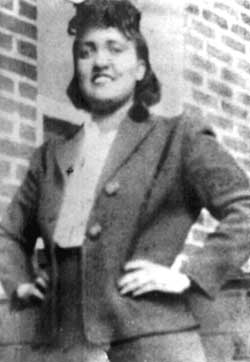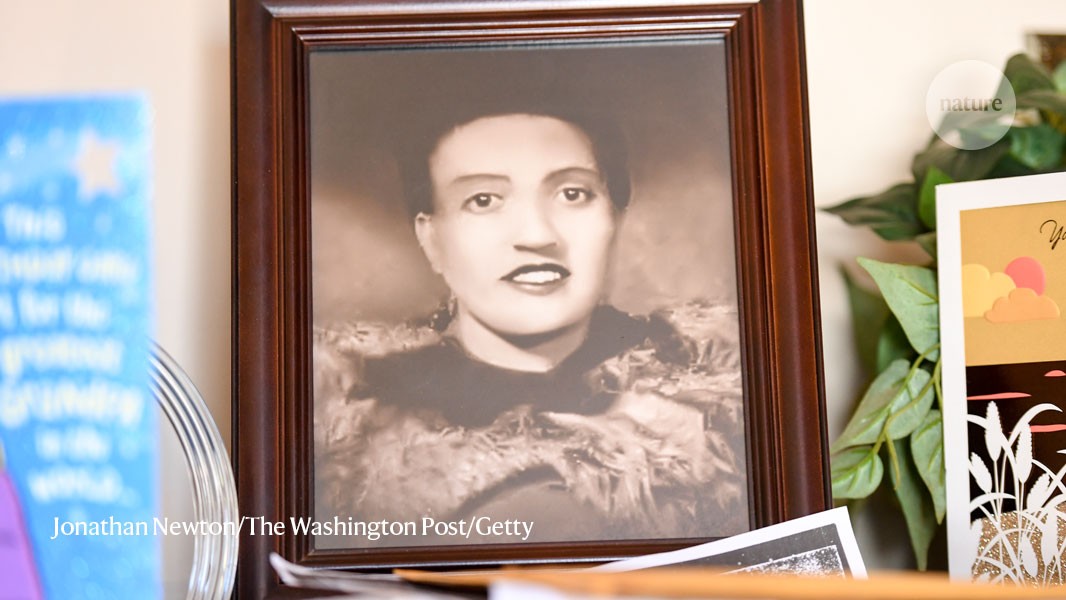- Mar 11, 2015
- 79,901
- 42,665
- 2,645
Here is another example of how past racism by whites have iimpacted blacks today. Companies have made billions from this and the famiy has receved none of the money.
Henrietta Lacks (born Loretta Pleasant; August 1, 1920 – October 4, 1951) was an African-American woman whose cancer cells are the source of the HeLa cell line, the first immortalized human cell line and one of the most important cell lines in medical research. An immortalized cell line reproduces indefinitely under specific conditions, and the HeLa cell line continues to be a source of invaluable medical data to the present day.
Lacks was the unwitting source of these cells from a tumor biopsied during treatment for cervical cancer at Johns Hopkins Hospital in Baltimore, Maryland, in 1951. These cells were then cultured by George Otto Gey, who created the cell line known as HeLa, which is still used for medical research. As was then the practice, no consent was required to culture the cells obtained from Lacks's treatment. Neither she nor her family were compensated for the extraction or use of the HeLa cells.
Even though some information about the origins of HeLa's immortalized cell lines was known to researchers after 1970, the Lacks family was not made aware of the line's existence until 1975. With knowledge of the cell line's genetic provenance becoming public, its use for medical research and for commercial purposes continues to raise concerns about privacy and patients' rights.

 en.wikipedia.org
en.wikipedia.org

 www.hopkinsmedicine.org
www.hopkinsmedicine.org
That day in Erika Johnson’s high-school biology class, some 20 years ago, is seared into her memory. The teacher was leading the students through experiments involving cells from a widely used line known as HeLa. The cell line originated from tissue taken from a woman named Henrietta Lacks — and Johnson’s mother was a Lacks. “This is my great-grandmother I’m holding in my hand,” Johnson remembers feeling. “It was a very surreal situation.”
Last month marked 100 years since Lacks’s birth. She died in 1951, aged 31, of an aggressive cervical cancer. Months earlier, doctors at the Johns Hopkins Hospital in Baltimore, Maryland, had taken samples of her cancerous cells while diagnosing and treating the disease. They gave some of that tissue to a researcher without Lacks’s knowledge or consent. In the laboratory, her cells turned out to have an extraordinary capacity to survive and reproduce; they were, in essence, immortal. The researcher shared them widely with other scientists, and they became a workhorse of biological research. Today, work done with HeLa cells underpins much of modern medicine; they have been involved in key discoveries in many fields, including cancer, immunology and infectious disease. One of their most recent applications has been in research for vaccines against COVID-19.
But the story of Henrietta Lacks also illustrates the racial inequities that are embedded in the US research and health-care systems. Lacks was a Black woman. The hospital where her cells were collected was one of only a few that provided medical care to Black people. None of the biotechnology or other companies that profited from her cells passed any money back to her family. And, for decades after her death, doctors and scientists repeatedly failed to ask her family for consent as they revealed Lacks’s name publicly, gave her medical records to the media, and even published her cells’ genome online. (Following an outcry, the genome was soon removed.) Nature later published the genome of another HeLa line1 after the Lacks family reached an agreement with the US National Institutes of Health (NIH) to approve its release.

 www.nature.com
www.nature.com
Henrietta Lacks (born Loretta Pleasant; August 1, 1920 – October 4, 1951) was an African-American woman whose cancer cells are the source of the HeLa cell line, the first immortalized human cell line and one of the most important cell lines in medical research. An immortalized cell line reproduces indefinitely under specific conditions, and the HeLa cell line continues to be a source of invaluable medical data to the present day.
Lacks was the unwitting source of these cells from a tumor biopsied during treatment for cervical cancer at Johns Hopkins Hospital in Baltimore, Maryland, in 1951. These cells were then cultured by George Otto Gey, who created the cell line known as HeLa, which is still used for medical research. As was then the practice, no consent was required to culture the cells obtained from Lacks's treatment. Neither she nor her family were compensated for the extraction or use of the HeLa cells.
Even though some information about the origins of HeLa's immortalized cell lines was known to researchers after 1970, the Lacks family was not made aware of the line's existence until 1975. With knowledge of the cell line's genetic provenance becoming public, its use for medical research and for commercial purposes continues to raise concerns about privacy and patients' rights.

Henrietta Lacks - Wikipedia

The Legacy of Henrietta Lacks
Henrietta Lacks: science must right a historical wrong
In Henrietta Lacks’s centennial year, researchers must do more to ensure that human cells cannot be taken without consent.That day in Erika Johnson’s high-school biology class, some 20 years ago, is seared into her memory. The teacher was leading the students through experiments involving cells from a widely used line known as HeLa. The cell line originated from tissue taken from a woman named Henrietta Lacks — and Johnson’s mother was a Lacks. “This is my great-grandmother I’m holding in my hand,” Johnson remembers feeling. “It was a very surreal situation.”
Last month marked 100 years since Lacks’s birth. She died in 1951, aged 31, of an aggressive cervical cancer. Months earlier, doctors at the Johns Hopkins Hospital in Baltimore, Maryland, had taken samples of her cancerous cells while diagnosing and treating the disease. They gave some of that tissue to a researcher without Lacks’s knowledge or consent. In the laboratory, her cells turned out to have an extraordinary capacity to survive and reproduce; they were, in essence, immortal. The researcher shared them widely with other scientists, and they became a workhorse of biological research. Today, work done with HeLa cells underpins much of modern medicine; they have been involved in key discoveries in many fields, including cancer, immunology and infectious disease. One of their most recent applications has been in research for vaccines against COVID-19.
But the story of Henrietta Lacks also illustrates the racial inequities that are embedded in the US research and health-care systems. Lacks was a Black woman. The hospital where her cells were collected was one of only a few that provided medical care to Black people. None of the biotechnology or other companies that profited from her cells passed any money back to her family. And, for decades after her death, doctors and scientists repeatedly failed to ask her family for consent as they revealed Lacks’s name publicly, gave her medical records to the media, and even published her cells’ genome online. (Following an outcry, the genome was soon removed.) Nature later published the genome of another HeLa line1 after the Lacks family reached an agreement with the US National Institutes of Health (NIH) to approve its release.

Henrietta Lacks: science must right a historical wrong
In Henrietta Lacks’s centennial year, researchers must do more to ensure that human cells cannot be taken without consent.


/https%3A%2F%2Ftf-cmsv2-smithsonianmag-media.s3.amazonaws.com%2Ffiler_public%2F18%2Ff5%2F18f511e8-1be1-4fe5-ae4b-585a79747d84%2Fgettyimages-1235692354.jpg)

